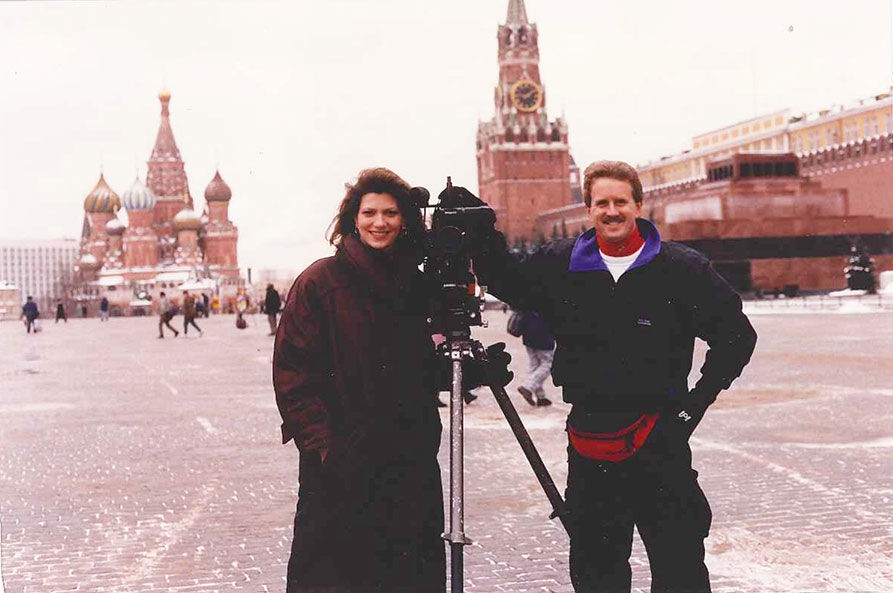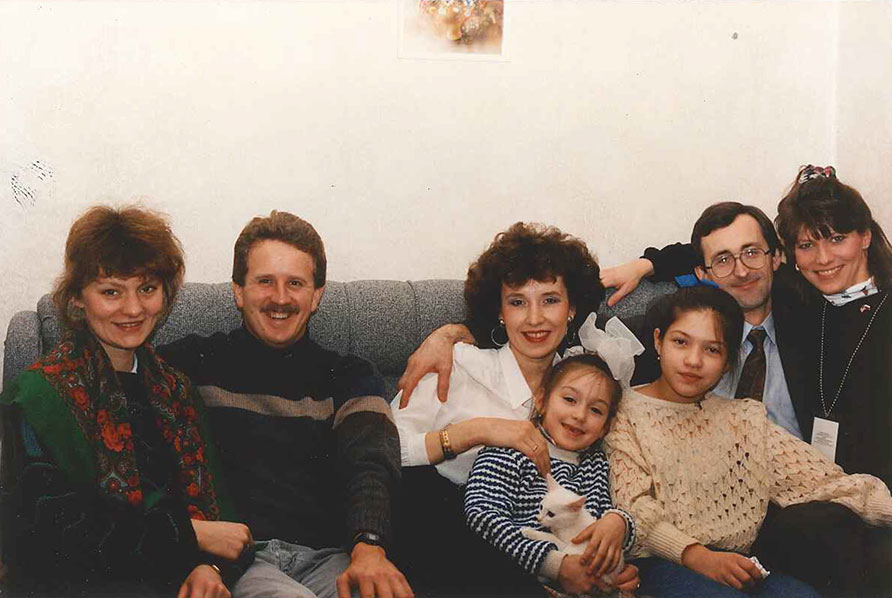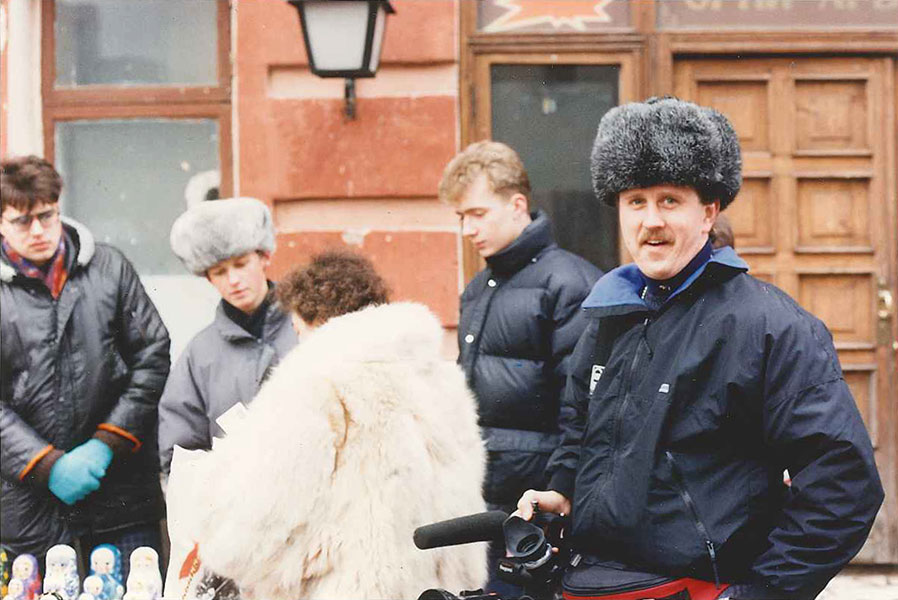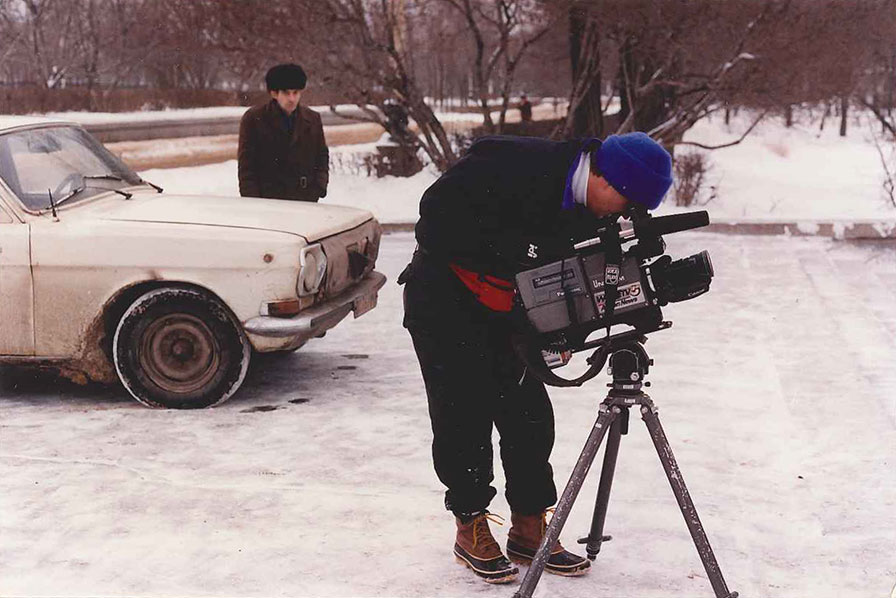
We conclude our TBT Russian theme with another news trip to the “land of the bear.” It is 1992 and our intrepid international correspondents are WRAL News anchor Donna Gregory and photographer Jay Jennings. The name of the country has changed from Union of Soviet Socialist Republic to simply Russia. In fact, the name changed less than a month before their arrival marking the dissolution of the USSR.
This trip had a better start than the one in ’82; the camera was not held hostage! However, just as the location is out of the ordinary, so are the experiences. Once again, this excursion falls into the category of, “you can’t make this stuff up!”
 Donna Gregory and Jay Jennings at Red Square in Moscow.
Donna Gregory and Jay Jennings at Red Square in Moscow.
Pam: How did the trip come about?
Jay: My understanding is that a group called the Friendship Force had two spots for a trip to Russia available and contacted Jim and Barbara Goodmon to see if they would like to go. (The Friendship Force is an international organization that promotes cultural exchange and understanding through a variety of trips such as these.) From what I was told, Mr. Goodmon wanted members of the WRAL-TV News department to go instead. That’s when Donna Gregory and I got the assignment.
Pam: Was this your first assignment to travel out of the country for WRAL?
Jay: Other than poking my nose into Canada and Mexico as a child, I had never traveled outside the United States. So my first international trip was going to be on assignment for WRAL-TV to a nation that was our Cold War enemy less than one month before! No pressure, huh? The Soviet government fell in late December of 1991. We had no idea what to expect as tourists, much less journalists. How would they treat us after we started videotaping? Would the KGB toss us in some Siberian gulag where we would never be seen again? Throw in the fact that we were using the MII video format. If something broke, there was no place to beg, borrow, or steal more gear. I was scared to death
Pam: Where did you stay and how did you communicate?
Jay: Donna Gregory and I stayed with two different host families. She stayed with a single mom named Elle Lysova. My host was Vladimir Kozlov and his family. According to our Friendship Force team leaders, Vladimir could speak English. Once we met, it was painfully apparent that he took English 20 plus years before while in college and hadn’t used it much since. We spent much of our first 24 hours together pointing, pantomiming, and picking out words from a Russian/English dictionary. The weirdest thing happened to several members of our group. It seemed that our hosts understood our English a little better if you spoke with a bad Russian accent. Before you knew it, I was speaking like Boris Badenov, the archenemy of Rocky and Bullwinkle.
 (L –R) Elle Lysova, Jay Jennings, the Koslov family and Donna Gregory
(L –R) Elle Lysova, Jay Jennings, the Koslov family and Donna Gregory
Pam: What were your first impressions? What was the climate like, as in weather climate? And what was the climate like, in the political sense? Perceptions confirmed or shattered?
Jay: We traveled to Moscow in mid-January. It was bitterly cold. Temperatures were between –5 and +15 F most of the time we were there. Only on the last part of our stay did the thermometer creep into the low 20s.
 Jay Jennings keeping his head warm with a Russian ushanka hat.
Jay Jennings keeping his head warm with a Russian ushanka hat.
The political climate was absolutely fascinating. While just about everyone we met was very excited about the fall of communism in their country, many were still dubious about those in power. I remember asking my host Vladimir what he thought of Russian politicians like Gorbachev and Yeltsin. His response was classic. “It doesn’t matter. They’re all still communists!”
Donna and I had absolutely no clue how we would be received by the Russian people. Would they see us as the enemy? Would they trust us? Would they be willing to open their lives and tell us their stories? We were totally blown away by their hospitality! Everyone wanted to shake our hands and talk to us. They wanted to meet the American visitors and hear what the U.S. was really like. I lost count of the times we would be shooting on the street and someone would demand we come back to their home. People would open bottles of champagne and serve caviar to us as if we were visiting dignitaries.
One thing I didn’t expect was what we saw inside the Kremlin. We took a tour behind the massive walls as part of our trip (sadly, no cameras allowed!). I expected to see all sorts of Soviet military and political facilities. While there were a few, most of what’s there are churches. We found seven of the oldest church buildings in the Russian Orthodox faith, one dating back to 1326.
Pam: It seems that every reporter and photographer who travel out of the country return with several stories that start out with, “I’m not making this up…” So, what is your story?
Jay: One night, Donna and I attended a lengthy dinner party on the other side of Moscow. When it wrapped up sometime around midnight, Vladimir took us to catch the bus as we began our long commute back. It was bone-chillingly cold. The three of us stood at one end of the bus stop and noticed an older gentleman about 50 feet away under a street light. Middle aged, wearing a fedora and a trench coat, and smoking a cigarette. He was right out of central casting, looking every bit the part of what you would expect a KGB agent to look like.
He began walking toward us. He approached us and simply said, “Amerikanski?” (Russian for “American?”). We said “yes,” and he replied, “Frank Sinatra.” At first we couldn’t figure out why he would bring up Old Blue Eyes on a sidewalk at midnight in Moscow. Then the gentleman said, “You, sing for me, Frank Sinatra.” That’s when I began singing the only Sinatra tune that came to mind, “Strangers in the Night.” After just a couple of lines, the man smiled and applauded! Could there have been a more appropriate song to provide a soundtrack not just for that moment but the entire trip?
 Who is this mysterious man keeping a close eye on Jay? No intrigue here. He was the driver who delivered Jay and Donna to wherever they needed to go in Moscow.
Who is this mysterious man keeping a close eye on Jay? No intrigue here. He was the driver who delivered Jay and Donna to wherever they needed to go in Moscow.
Below are links to the eleven reports that chronicled Donna and Jay’s 1992 trip to Moscow with the Friendship Force. We have included a bonus feature of Vladimir Kozlov’s trip to Cary! Prekrasno! (Excellent!)
CBC History VIDEO: News Coverage of NC Friendship Force visit to Moscow, 1992:
BONUS FEATURE
Thanks to Corp’s Pam Allen for this capcom story & these photos. Pam Parris Allen is a former WRAL newscast producer/director who now works as a researcher and producer on the CBC History Project.